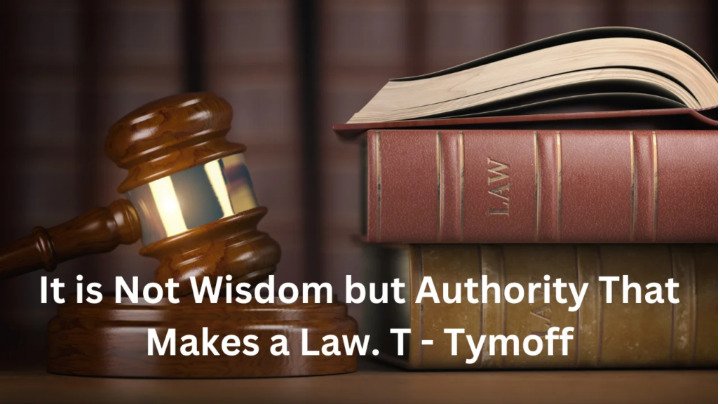The statement “It Is Not Wisdom But Authority That Makes A Law. T – Tymoff” attributed to Thomas Hobbes, succinctly captures a fundamental truth about legal systems worldwide. This concept, rooted in Hobbes’ political theories, suggests that the legitimacy of law stems not from its inherent wisdom or moral value but from the power that enforces it. Throughout this article, we will delve into how authority has historically overshadowed wisdom in the realm of lawmaking, examine the implications of such a dynamic, and consider if there is room for a shift towards more wisdom-oriented legal systems in the future. Our exploration will traverse various epochs and systems, providing a comprehensive understanding of the authority-wisdom dichotomy in legal frameworks.
Table of Contents
The Origins of the Quote and Its Philosophical Underpinnings
Thomas Hobbes, an influential philosopher of the 17th century, argued that human life without government would be “solitary, poor, nasty, brutish, and short.” His assertion that “It Is Not Wisdom But Authority That Makes A Law. T – Tymoff” is derived from his belief that a strong, centralized authority—or Leviathan—is essential to maintain order and enforce laws. This perspective emphasizes that the power of law comes from the ability to enforce it, not necessarily the wisdom or morality it embodies. By exploring Hobbes’ views, we can better understand the foundations of legal systems that prioritize authority, reflecting on how these principles have been manifested in various forms of governance throughout history.
Authority vs. Wisdom in Historical Lawmaking Practices
Historically, many societies have seen authority take precedence over wisdom in the creation and enforcement of laws. For instance, in ancient empires such as Rome and Egypt, laws were often decreed by rulers whose authority was considered absolute, with little consideration for collective wisdom or moral reasoning. These laws enforced order and consolidation of power rather than justice or equity. A more modern example can be seen in colonial empires where laws were imposed to control and exploit rather than to govern wisely. This contrast highlights how the balance between authority and wisdom has been tilted towards the former, often at the cost of fairness and ethical governance.
Contemporary Examples of Authority in Law
In today’s world, the principle that authority makes law can be observed in various authoritarian regimes where laws serve as tools for power rather than instruments of justice. For example, in North Korea, the legal system is strictly controlled by the state, and laws are often used to suppress dissent and maintain the regime’s control. Similarly, in times of crisis, democratic governments may enact emergency laws that expand their authority rapidly, sidelining the usual legislative processes supposed to ensure wise and fair governance. These instances demonstrate the ongoing relevance of Hobbes’ idea in contemporary legal contexts, where authority often still overrides wisdom.
The Impact of Authority-Driven Laws on Society
The predominance of authority in lawmaking can have profound impacts on society. Laws based on authority rather than wisdom can lead to abuses of power, human rights violations, and a general lack of fairness in the justice system. For instance, laws that criminalize dissent or suppress minority rights are often justified through the necessity of maintaining order (authority) rather than promoting justice (wisdom). This can erode trust in legal institutions and lead to societal unrest, highlighting the need for a balance where laws are not only enforceable but also just and wise. ”It Is Not Wisdom But Authority That Makes A Law. T – Tymoff”
Comparing Legal Philosophies: Authority vs. Wisdom
Comparing different legal philosophies illuminates the benefits and drawbacks of authority-based versus wisdom-based lawmaking. Natural law theory, for example, advocates that laws should be based on moral reasoning and wisdom, aligning legal principles with ethical values. This contrast with Hobbesian theory shows that while authority can enforce compliance, laws grounded in wisdom potentially foster a more harmonious society by aligning legal authority with moral authority.
The Future of Lawmaking: Can Wisdom Gain the Upper Hand?
Looking forward, the question remains whether lawmaking can evolve to incorporate more wisdom, reducing the historical over-reliance on authority. With the rise of digital media and global communication, public engagement in the legislative process is increasing, potentially leading to more democratically-informed laws that balance authority with wisdom. Additionally, educational advances could empower more citizens to demand wise and just laws, suggesting a future where Hobbes’ assertion may be less an axiom and more a cautionary tale.
Conclusion
In exploring the dynamics of authority and wisdom in lawmaking, it is clear that while authority is necessary to enforce laws, the integration of wisdom can lead to fairer and more just societies. By understanding the historical context and philosophical underpinnings of Hobbes’ quote, we can strive for a future where laws reflect both enforceable authority and enlightened wisdom. Let’s engage in discussions and actions that promote a balanced approach to lawmaking, ensuring laws serve not only the purpose of order but also the ideals of justice. ”It Is Not Wisdom But Authority That Makes A Law. T – Tymoff”
Read More : 5StarsStocks

